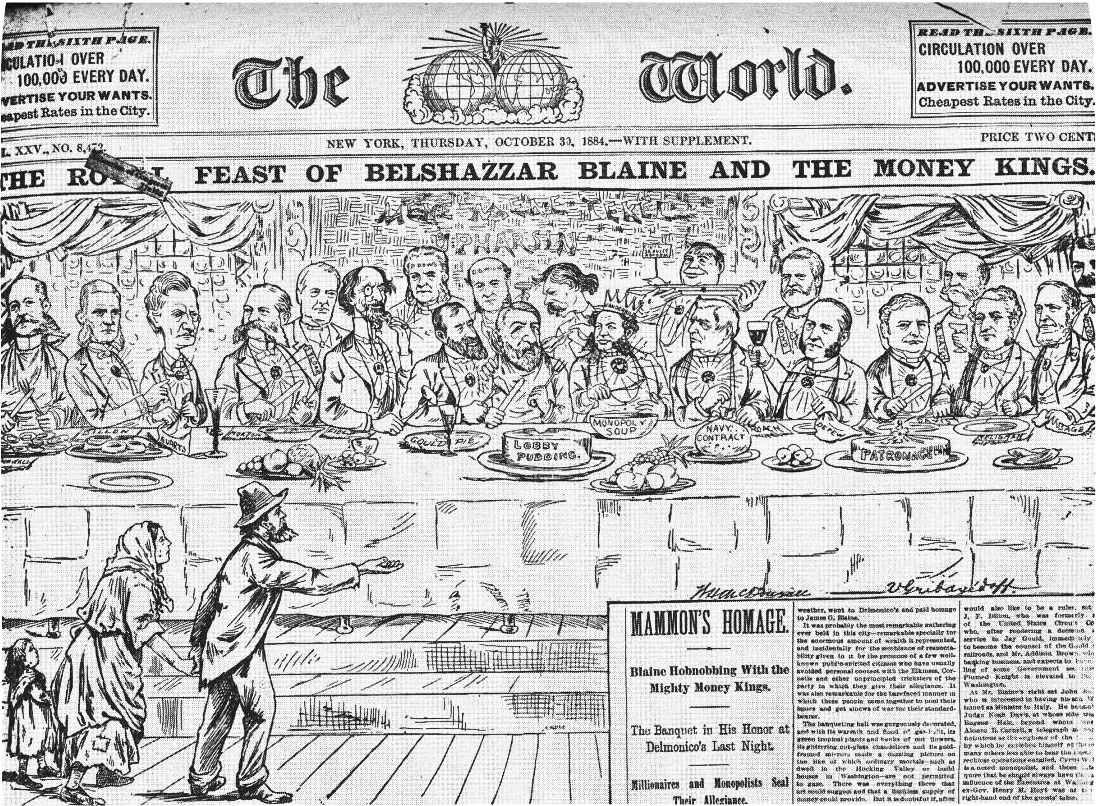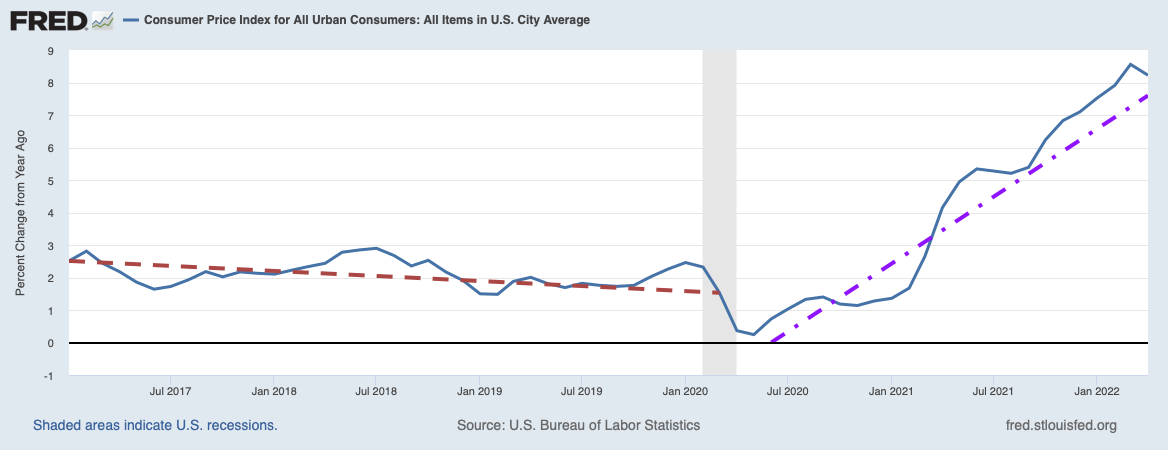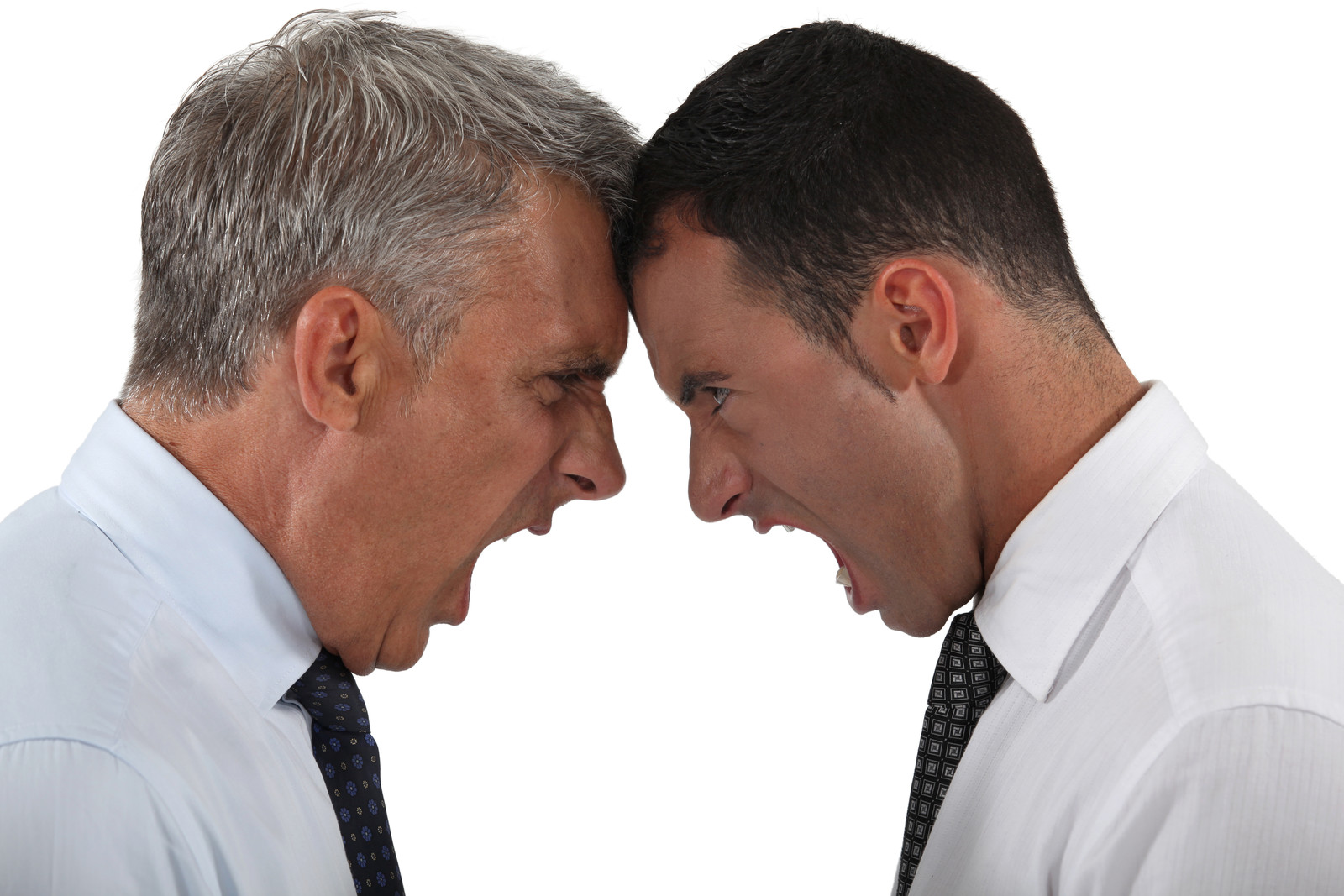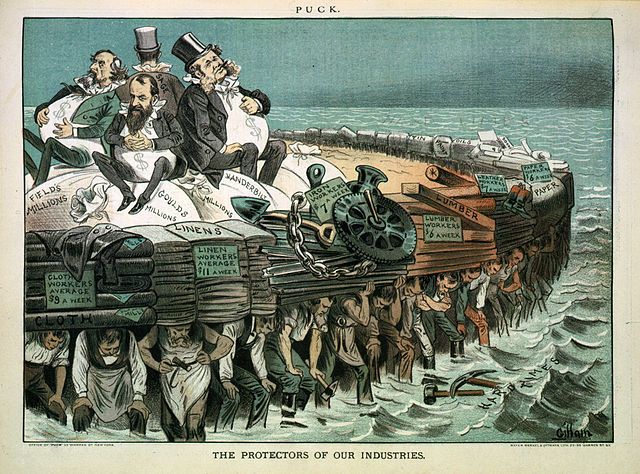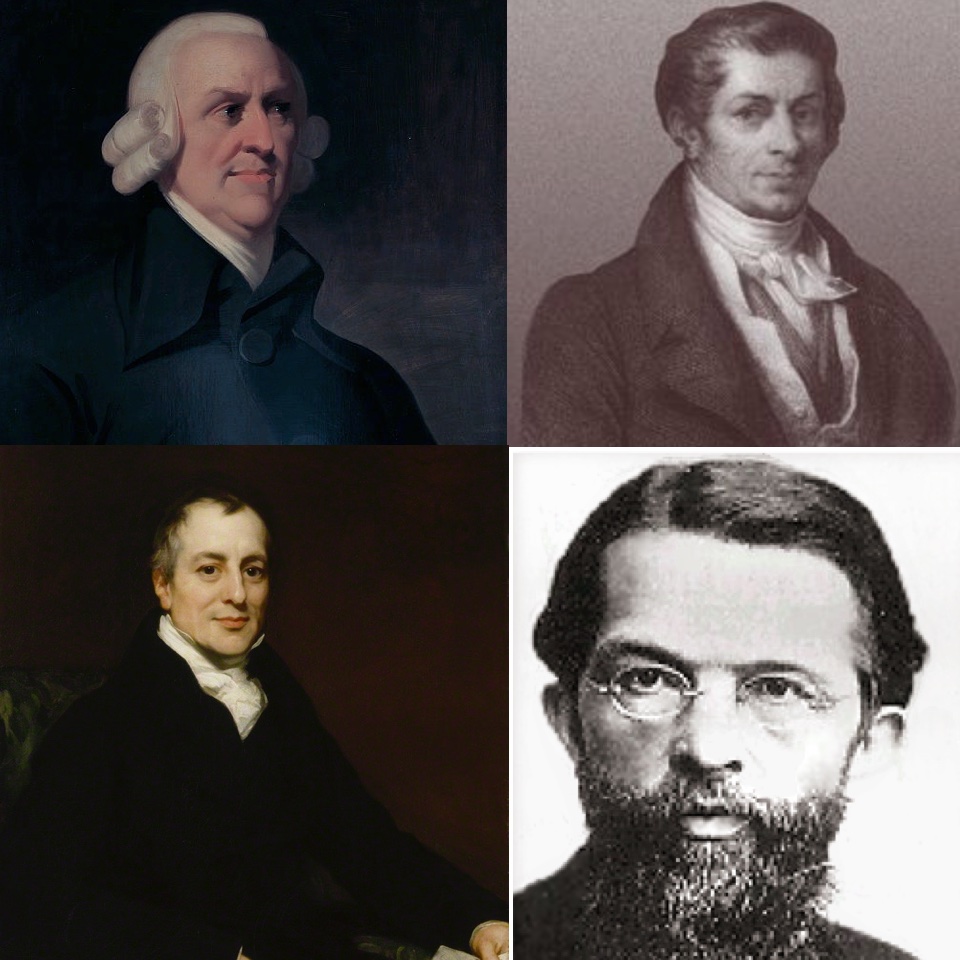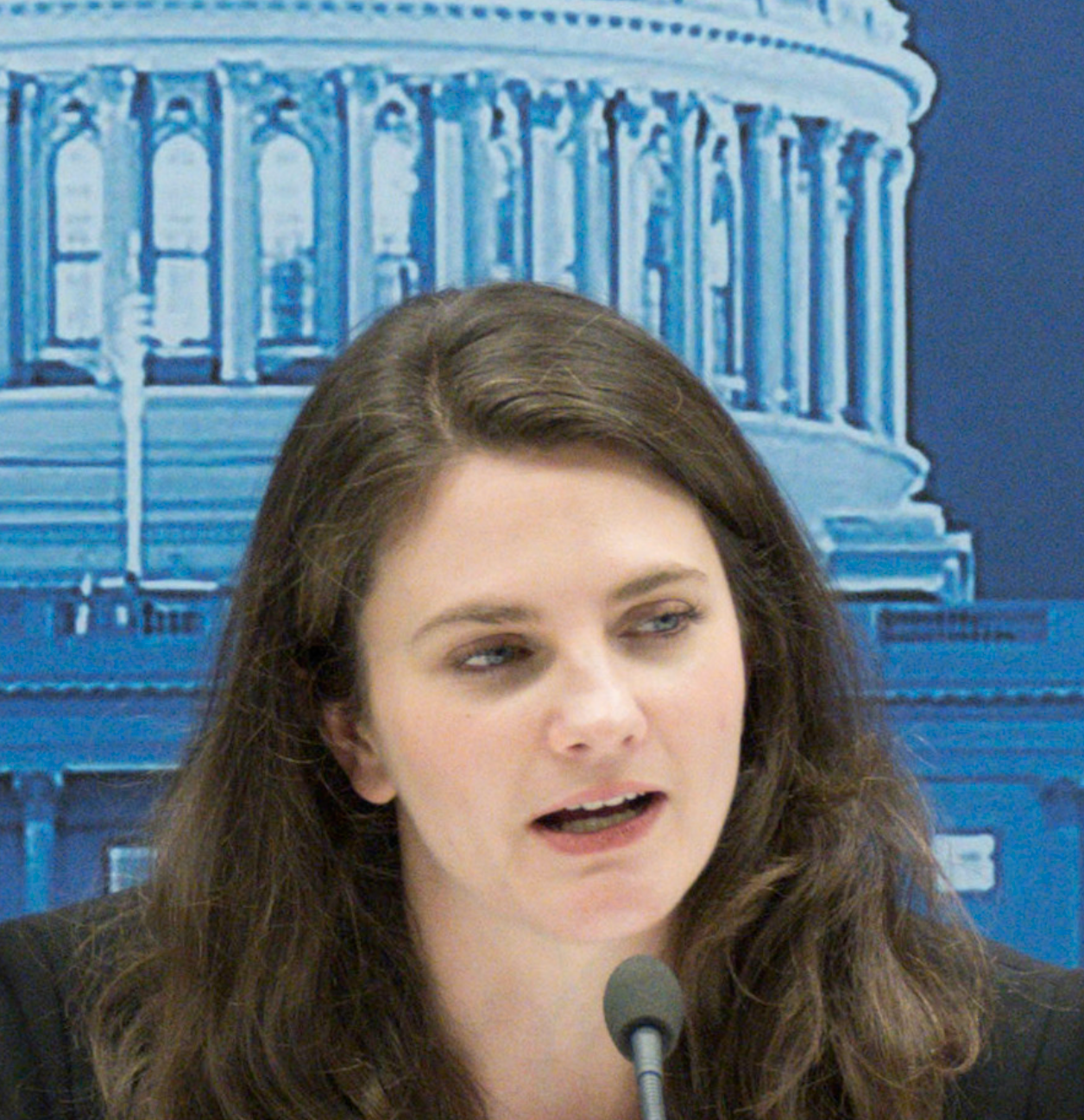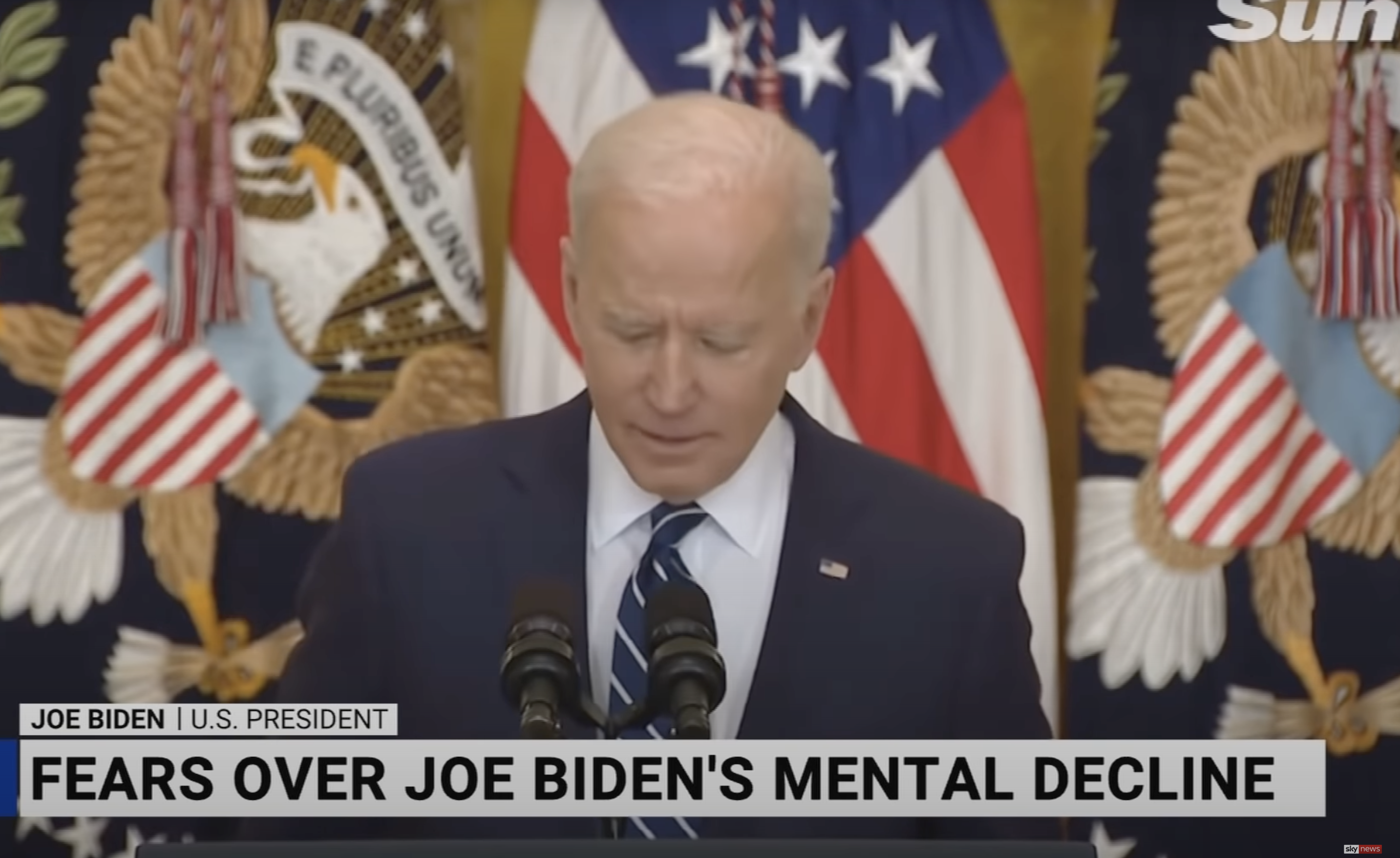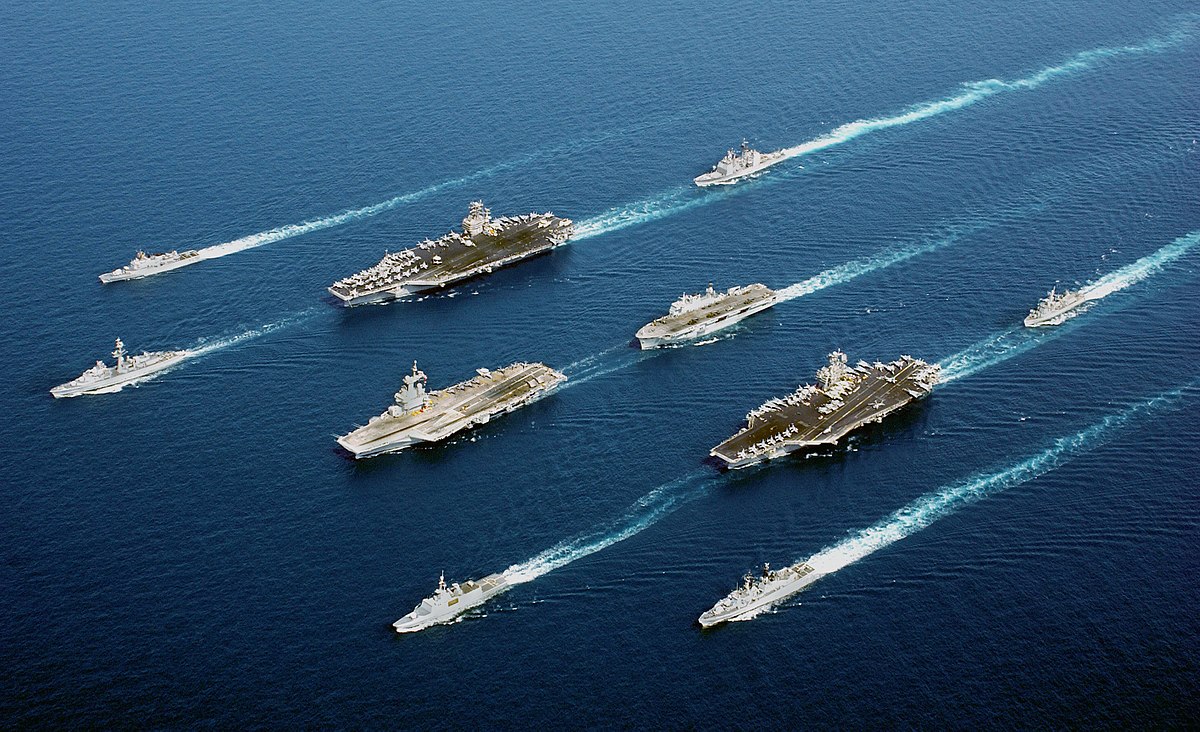Is Trump Killing the Liberal World Order?
A NATO naval fleet including warships from five nations. In four descending columns, from left to right: ITS Maestrale (F 570), De Grasse (D 612); USS John C. Stennis (CVN-74), Charles de Gaulle (R91), Surcouf (F 711); USS Port Royal (CG-73), HMS Ocean (L12), USS John F. Kennedy (CV-67), ITS Luigi Durand de la Penne (D560); and HNLMS Van Amstel (F 831).
Wikimedia Commons / U.S. Navy / PH3 Alta I. Cutler
Richard N. Haass, writing on the Project Syndicate website, declares
America’s decision to abandon the global system it helped build, and then preserve for more than seven decades, marks a turning point, because others lack either the interest or the means to sustain it. The result will be a world that is less free, less prosperous, and less peaceful, for Americans and others alike.
Is this an accurate assessment of the world’s condition? Is it an accurate picture of U.S. intentions? Is the liberal world order at risk?
The Dangers of Abandoning the Global World System
At the beginning of his essay, Haass remarked,
After a run of nearly one thousand years, quipped the French philosopher and writer Voltaire, the fading Holy Roman Empire was neither holy nor Roman nor an empire. Today, some two and a half centuries later, the problem, to paraphrase Voltaire, is that the fading liberal world order is neither liberal nor worldwide nor orderly.
Haass’ statement of the current status of the western world system is precisely accurate: The old system created at the end of World War II is not worldwide; only the grossly uninformed would consider it orderly; and it is most certainly not liberal. Rather than being a liberal system, it has evolved into a mostly dirigiste system. According to Richard Haass, the system built after World War II
was [to be] liberal in the sense that it was to be based on the rule of law and respect for countries’ sovereignty and territorial integrity. Human rights were to be protected. All this was to be applied to the entire planet; at the same time, participation was open to all and voluntary. Institutions were built to promote peace (the United Nations), economic development (the World Bank) and trade and investment (the International Monetary Fund and what years later became the World Trade Organization).
This world system did not cover the entire planet, unfortunately, but was vigorously opposed by the socialist authoritarian regimes of the Soviet Union, the People’s Republic of China, and of the Warsaw Pact. Nevertheless, the United States guaranteed the liberal world order’s continued existence through its economic and military power. Without this guarantee the communist powers would have divided up most of the world in short order.
Then, the dissolution of the Soviet Union in 1991 presented the world with a stroke of good fortune. This fortunate circumstance led one analyst, Francis Fukuyama, to declare “The End of History”, by which he meant the end of international ideological conflict. It also motivated U.S. President George H. W. Bush and U.K. Prime Minister Margaret Thatcher to begin a decline in defense spending as a “peace dividend.” As a percent of GDP, U.S. defense spending fell fairly steadily throughout the 1990s until Islamic jihadists told us on September 11, 2001 that lethal world ideological conflict had not ended after all.

Source: USgovernmentspending.com
Our NATO allies followed our example as their defense spending also fell precipitously. Faced with the expenses of their welfare states and endangered economically with stagnating GDP growth, Western European governments were more than willing to redirect spending away from military and naval needs. In 2006 the NATO allies had agreed that each would spend two percent of their GDP on their armed forces. Yet in 2016 just 5 of the 28 alliance members were meeting that obligation: the U.S. (3.61% of GDP on defense), Greece (2.38%), the United Kingdom (2.21%), Estonia (2.16%), and Poland (2.0%). The most egregious transgressors were Belgium, Luxembourg, Hungary, and Spain. None of them spent even one percent of GDP on defense. Certainly, the late Obama administration provided no inspiration by example for our allies.
As Haass notes, this is a very bad time in history for anyone to go wobbly on defense. Great power rivalry is again threatening to spiral out of control. Russia wants back their erstwhile empire that they lost with the dissolution of the Soviet Union. The People’s Republic of China wants to be the regional suzerain of the East, and perhaps to extend their dominance even further through their “One Belt, One Road” project. The ayatollahs of Iran would like to dominate the world of Islam. After their nuclear agreement with the West, the Iranian government has given many indications of their implacable hate for the West in general and for the United States (the “Great Satan”) in particular. Studying their attitudes about other societies, especially non-muslim ones , one could get the impression the ayatollahs share the same interpretation of the Quran’s “verse of the sword” (sura 9, verse 5) as do the jihadists of ISIS and al-Qaeda.
Richard Haass asks the following question: If the United States under Donald Trump is no longer willing to support a liberal world order, how can it continue to survive? For example, if the U.S. were to leave NATO, as Trump has threatened to do if the other allies do not meet their defense spending commitments, how long could Europe withstand a Russian military attack? If Trump imposes general tariffs on countries which place even higher tariffs on U.S. goods, how well could the economies of the world withstand the resulting trade war?
Is Populism the Enemy of a Liberal World Order?
Haass identifies the forces of Western populism as a large part of the explanation for the decline of the liberal world order. He declares,
Liberalism is in retreat. Democracies are feeling the effects of growing populism. Parties of the political extremes have gained ground in Europe. The vote in the United Kingdom in favor of leaving the EU attested to the loss of elite influence. Even the US is experiencing unprecedented attacks from its own president on the country’s media, courts, and law-enforcement institutions. Authoritarian systems, including China, Russia, and Turkey, have become even more top-heavy. Countries such as Hungary and Poland seem uninterested in the fate of their young democracies.
Yet liberalism in the West was dying long before the current outbreak of populism. Let us be very precise on the meaning of the term “populism.” The Wikipedia article on populism states,
Populism is a political philosophy supporting the rights and power of the people in their struggle against a privileged elite.
From this definition you can see that a populist movement could lie anywhere in the political spectrum. Where it does fall in the spectrum depends on how the people in the movement think they are being abused by their ruling elites. In the U.S. the populists on the Right voted for Donald Trump in the 2016 general election. The American populists of the Left supported Sen. Bernie Sanders. The left wing populists blamed corporations and free-markets for their miseries. The right wing populists blamed government and its policies.
The Western elites who have so offended populist electorates have been of the center-left and of the Left. They believe government should be the primary tool for solving economic and social problems. In the process of trying to solve all a country’s problems through the coercive power of government, they began to centralize increasing amounts of power, particularly economic, in the state. Moreover, more often than not, the exercise of that power created other, sometimes more severe problems.
If you think about it for a moment, the policies of many Western elites to centralize ever more power in the state is the very opposite of any philosophy that could be called liberal. If liberalism does not mean a political philosophy concerned with the protection of individuals from the abuses of government, then it means nothing. American progressives long ago lost the right to be called liberal, because they became more interested in increasing government power to solve social problems than in protecting the individual from the state. The same can be said for the American progressives’ dirigiste European cousins.
Dirigiste government would not be so bad if their policies actually worked. Such governments would still be authoritarian, but at least they would solve problems. But dirigiste policies very seldom work without creating other, sometimes much worse problems. Sometimes they do not even ameliorate the perceived problems motivating the so-called government “solutions.” For example, in the U.S. progressives perceived the Great Recession of 2008-2009 as having been caused by greedy bankers and real estate investors. In point of fact, the ultimate cause was the housing policies of the federal government. Since they misunderstood the actual causes, their so-called “solution,” the Dodd-Frank Act, could not affect the fundamental problem. Instead, by imposing draconian controls and regulation of financial markets, progressives succeeded only in putting small community banks on the endangered list, among other ills. It also gave birth to a run-away rogue agency, the Consumer Financial Protection Bureau.
A European example of this sort of thing arose from perceptions of the European elite that they had a labor shortage problem, created in part by a declining natural population growth rate. The government solution was to encourage immigration. At the same time the values of multiculturalism held by the elites led them to not insist on the cultural assimilation of immigrants. Europeans have paid a very high price for not insisting on such assimilation. Multiculturalism has led to their vulnerability to Islamic terrorist attacks by allowing separate enclaves for Muslims, the so called “no-go” zones. These are areas where sharia law is observed, and where police, fire-fighters, and other representatives of the government do not normally venture. Simultaneously, the economies of European nations evolved in a direction that caused them to have slower growth. As a result it became increasingly hard for the immigrants to advance economically. Denied opportunity and despairing of finding any reasons for hope, the Muslim expatriate communities became natural recruiting grounds for the jihadists.
The proliferation of unintended consequences in examples like these should be a big clue to Western elites. By governments becoming more authoritarian and less liberal, they have made their part of the world order increasingly dysfunctional. It is not tremendously difficult to discover the reason for this dysfunction. The problem lies in some of the most fundamental aspects of dirigiste ideology. Dirigistes of all kinds believe they can solve economic and social problems using the coercive power of government. Moreover, they believe they can do this usually without creating other, more serious problems. That is their fundamental error.
Large systems of interacting human beings, the economy included, are chaotic systems. This means that a very small change in the system’s state can cause it to evolve in very different and unpredictable directions. The reasons for this chaotic nature of human social systems are exactly the same as the reasons causing the planetary atmosphere to be chaotic. These kinds of systems have a very large number of interacting components with an even larger number of degrees of freedom directly proportional to the number of system components. These components in human systems are of course the human beings themselves. The interacting components of the atmosphere are the molecules composing it. One other attribute common to both human systems and N-body fluid systems like the atmosphere is the system components tend to interact with each other locally. When a pair of components interact they tend not to interact with the other components at the same time. In the atmosphere the primary type of interaction is a collision between pairs of molecules. In an economy, the primary interaction is a trade between a seller and a buyer of some good. Macroscopic system-wide influences can be very important, e.g. gravity and solar radiation for the atmosphere, and government regulations and taxation for the economy, Nevertheless, the primary interactions causing the system to be chaotic are between pairs of system components.
It is important to realize that a chaotic social system is not necessarily one susceptible to collapse. They can be relatively stable with the chaos causing changes in the production of what human beings desire. In the chaotic weather system of the Earth, quasi-stability can form from local balances of air pressure and temperature, with high and low pressure fronts passing through to equilibrate pressures and temperatures. In a chaotic economy local quasi-stable equilibria can form with supply-demand balances.
Over the last century or so, Western governments have increasingly interfered with the inner mechanics of their economies. This government intrusion has gradually stifled their economies’ capability to grow. Almost by definition, this process (called the Road to Serfdom by Friedrich Hayek) is one that causes a society to become less liberal. The aggrandizement of government power favored by dirigistes is by definition anti-liberal. Ironically, it is the dirigiste elites of the West themselves that have been an important cause of the decline of the liberal world order.
If the various populist movements in the West should cause government regulation and taxation to decrease, they will then fortify — not weaken — a liberal world order.The resulting increase in economic wealth will increase the capability of Western governments to provide for their own defense. But, most certainly, populist political movements share no guilt in the waning of the liberal world order.
Donald Trump’s Shock Therapy for the World System
So if populism is not to blame for the decline of the liberal world order, what degree of culpability does Donald Trump have? To date, very little. However, if Trump were to finally abandon Western Europe to the tender mercies of the Russian Federation, or if he precipitates a gut-busting international trade war, liberal democracies would become an endangered species.
Nevertheless, Trump appears to be using his threats to abandon Europe and free-trade to extort better behavior on the part of other countries. The defensenews.com website reported last June that
across European allies and Canada, there was a 4.3 percent real increase in defense spending, equivalent to about $12 billion. This means that over the last three years, NATO members spent almost $46 billion more on defense.
On the other hand, The Hill website reported last month,
Out of NATO’s 29 member states, 14 have made plans to reach the 2 percent military spending goal by 2024. Eight of those countries are already hitting that target: the U.S., the United Kingdom, Greece, Latvia, Lithuania, Poland, Estonia and Romania. Six others — Bulgaria, France, Hungary, Montenegro, Slovakia and Turkey — are planning to meet the target by the deadline.
What will the unpredictable Trump do? All of us — but especially our NATO allies — should be very worried.
The same sort of remarks can be made about Trump’s attitudes about foreign trade and tariffs. No one should be under any illusion that Trump will not do precisely what he threatens if other nations insist on charging U.S. companies much higher tariffs than our government charges theirs. Trump would like for Congress to give him the authority to charge the same tariffs on other countries as they charge us. This would put the U.S. in direct conflict with the World Trade Organization, which advocates that richer countries pay higher tariffs than poorer ones. Yet if anything is true about Trump’s attitudes, he is totally opposed to the U.S. continuing to be the rich patsy for other nations. The probabilities for a trade war are still high.
Nevertheless, if everyone were perfectly rational and if free-markets made all the economic decisions (two extremely big ifs), then absolutely no country would ever charge tariffs on their imports. Tariffing your imports can only hurt your country’s economy by raising costs. Import substitution of goods also releases capital for other investments previously used to produce those goods. Problems only arise because of imports if forces other than market forces determine trade. This situation occurs when countries attempt to “dump” their goods in other countries at prices below their production cost; or if something else (such as intellectual property) is extorted for the privilege of trade. Trump does have a point about those two special cases. If he can get countries like China to behave because of his threats, the world order will be that much better off. Otherwise, we can all expect very uncomfortable economic times. Countries with mercantilist policies like China could find those uncomfortable times existentially challenging.
Views: 2,232























